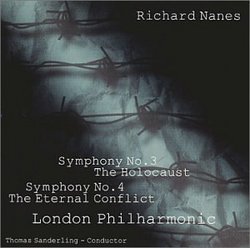| All Artists: Richard Nanes, Thomas Sanderling, London Philharmonic Orchestra Title: Nanes: Symphony No. 3 - The Holocaust/Symphony No. 4 - The Eternal Conflict Members Wishing: 0 Total Copies: 0 Label: Delfon Records Release Date: 9/27/1994 Genre: Classical Style: Symphonies Number of Discs: 1 SwapaCD Credits: 1 UPC: 093477405027 |
Search - Richard Nanes, Thomas Sanderling, London Philharmonic Orchestra :: Nanes: Symphony No. 3 - The Holocaust/Symphony No. 4 - The Eternal Conflict
 | Richard Nanes, Thomas Sanderling, London Philharmonic Orchestra Nanes: Symphony No. 3 - The Holocaust/Symphony No. 4 - The Eternal Conflict Genre: Classical
|
Larger Image |
CD Details |
CD ReviewsPretentious, Pseudo-Profound Garbage John Grabowski | USA | 07/27/2005 (1 out of 5 stars) "How did Thomas Sanderling get suckered into a recording like this? (I'm glad at least it wasn't his father Kurt, a conductor I have much more respect for.) This is not just a failed effort, or a nice try; it strikes me as a cynical presentation of something as "high art" at a time when most performers (unless they are female, under 24, and are willing to bare their midriffs) cannot get an audience or a recording contract. If a black turtle-neck, mousse-haired college composition student were told to "compose a modern, challenging work that tells the horrors of civilization," this would be it. It's all cliches and over-worked orchestral effects, such as atonal shrieking strings and "piercing" melodies, set to thudding percussion. But strip away the shock effects and there's nothing underneath: nothing novel in the structure, style, or content, no inner-voicings. We just have simple dissonant fragments that repeat, and lots of volume to cover up the fact that it's not going anywhere and has the depth of soundtrack music for a Saturday horror flick. This sort of thing was done years ago, mostly as soundtracks to bad films. In fact, compared to this, John Williams sounds like Beethoven. It's an empty shell. I should have been clued in when the titles were "The Holocaust" and "The Eternal Conflict" (isn't that a video game?) that we were in for some serious pretention here. But the utter vapidity is mind-boggling, the lack of technical command of writing for a large ensemble is revealing. If you want to hear a real meditation on the holocaust, try Messiaen's Quartet For The End of Time. If you want to hear ruminations on the horrors of modern life, check out nearly anything by Shostakovich. These composers used dissonance, they used bombast, they used "modernism" too, but it had content, thought and variety. This composer, judging by these works, is an empty suit, and this CD an insult. This is one of the few times I wish I could award "no stars" in a review." Pretty darn awful! John Grabowski | 06/27/1999 (1 out of 5 stars) "Richard Nanes' music never seems to add up to much, or to take the listener anywhere particularly rewarding. Too often, Nanes seems to delight in the intentially ill-turned phrase. Why? Is it to deliberately engender audience dissatisfaction? These two symphonies are all too reminiscent of his other music: that is to say, alternatively boring and unpleasant, and ultimately wholly forgettable. The overblown title references (e.g., "The Holocaust Symphony") designed to attract attention and interest, don't fool us for long. Spend your hard-earned cash elsewhere on much better American contemporary composers, such as Richard Danielpour." Go elsewhere Classic Music Lover | Maryland, USA | 04/25/2008 (1 out of 5 stars) "If you're interested in contemporary American music that's actually worthwhile, avoid these two symphonies. Alternatively irritating and boring, this music (or is it mucus?) certainly won't hold your interest for long.
Pay no attention to the "important" descriptive titles the composer tacks on to many of his works -- they're simply designed to spark interest where there would otherwise be none. (But I'm sure most conductors, players and audiences wouldn't be fooled for long!)" |

 Track Listings (5) - Disc #1
Track Listings (5) - Disc #1